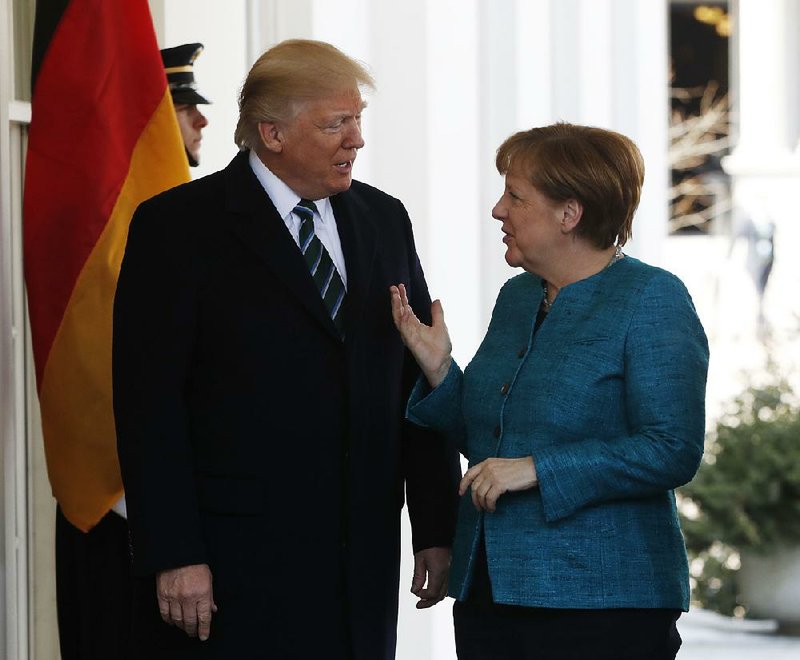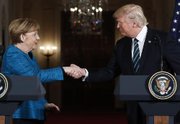WASHINGTON -- President Donald Trump on Friday said he has "strong support" for NATO and declared he is not an "isolationist" on free trade. But he emphasized during a White House summit with German Chancellor Angela Merkel that member nations must contribute their "fair share" to support the security alliance.
At a joint news conference, Trump said some NATO countries owe "vast sums" in dues, which is "very unfair to the United States."
"These nations must pay what they owe," Trump said, with Merkel standing next to him in the East Room.
Trump misstated how NATO financing works, saying that each nation agreed to contribute 2 percent of gross domestic product. In fact, outside of relatively small assessments to pay the physical costs of operating NATO headquarters and command facilities, the organization long ago set a goal that each of the 38 members would devote at least 2 percent of GDP to defense in their own budgets.
[PRESIDENT TRUMP: Timeline, appointments, executive orders + guide to actions in first 100 days]
The members contribute their capabilities to NATO, not monetary assessments. Those who haven't reached 2 percent, which is the majority of nations, don't "owe" or have to make up shortfalls of the past.
During the news conference, Trump also addressed immigration after decisions this week by federal judges to suspend, for a second time, his attempt to temporarily halt the U.S. refugee program and to impose a travel ban on select majority-Muslim nations in the Middle East and Northern Africa.
"Immigration is a privilege, not a right," Trump said, adding that "the safety of our citizens must always come first."
Merkel's decision to welcome large numbers of Syrian refugees stands in sharp contrast to Trump's insistence that the U.S.'s refugee program has made the country vulnerable to terrorist infiltration.
Merkel acknowledged the need to secure borders and work to integrate immigrants into society, but she emphasized that such goals have "to be done while looking at the refugees as well, given them the opportunity to shape their lives."
The White House event marked the first meeting for the leaders. Trump was sharply critical of Merkel during the presidential campaign, accusing her of "ruining Germany" over her more liberal policies on free trade and refugees. He also has expressed support for the United Kingdom's decision to leave the European Union, in which Germany is a key member.
When the subject turned to economic issues, Merkel attempted to project a conciliatory approach. She said the "success of Germans has always been one where the German success is one side of the coin and the other side of the coin has been European unity and European integration. That's something of which I'm deeply convinced."
Ahead of the news conference, the two sat for a brief photo op for reporters in the Oval Office, they said little and did not shake hands, though they did shake when Trump met her limousine outside the West Wing.
"It's always better to talk to one another than about one another," Merkel said through an interpreter at the news conference.
The friction between Trump and Merkel is a sharp contrast to Merkel's warm relationship with former President Barack Obama, whose worldview was largely aligned with Merkel's on many issues. Her meeting with Trump was being closely watched at home and abroad for signs of how the two leaders will engage each other, which could help determine the future of U.S. support for the European Union and NATO.
As much as Trump has rejected the linchpins of the post-World War II international order and Merkel has been its defender, German officials insisted her visit is intended to strengthen the relationship between the longtime allies.
Merkel said that while she represents German interests, Trump "stands up for, as is right, American interests. That is our task respectively." She said they were "trying to address also those areas where we disagree but tried to bring people together."
"We need to be fair with each other," Merkel said, saying both countries were expecting "that something good comes out of it for their own people."
Merkel arrived in Washington with an entourage that included German business executives to emphasize the important economic ties between the nations. Trump has opposed multilateral trade deals, and talks on a major U.S.-European pact called the Transatlantic Trade and Investment Partnership, which had been negotiated by the Obama administration, has bogged down.
Trump said he is not anti-trade, but wants "fair trade," and he reiterated his past criticism that U.S. trade policies have harmed U.S. workers. Trump also has said trade agreements have led to greater trade deficits. The U.S. trade deficit with Germany was $64.9 billion last year, the lowest since 2009, according to the Commerce Department.
"The negotiators for Germany have done a far better job than the negotiators for the United States, but hopefully we can even it out. We don't want victory, we want fairness," Trump said.
Merkel emphasized the need for trade deals that fairly benefit both countries. "That is the spirit I think in which we ought to be guided in negotiating any agreement between the United States of America and the EU," she said.
Trump also was asked whether legislative efforts, backed by the White House, to repeal and replace the Patient Protection and Affordable Care Act would ultimately be approved by Congress, despite widespread concerns among Republicans. Trump has sharply criticized the Affordable Care Act as a failing law, despite a review from the independent Congressional Budget Office that said up to 24 million Americans could lose health care coverage under the GOP proposal to replace it.
"It's going to be passed, I believe," said Trump, who met with conservative Republicans to talk about the bill on Friday morning. He said the group of lawmakers committed to supporting a version of the legislation, though he offered no specifics about the talks. "It's coming together beautifully. We have conservative groups, other groups, everybody wants certain things."
Information for this article was contributed by Abby Phillip, David Nakamura, Ashley Parker and Philip Rucker of The Washington Post and by Ken Thomas and Jill Colvin of The Associated Press.
A Section on 03/18/2017


